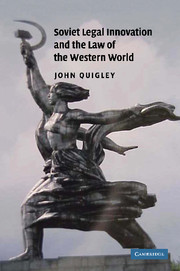Book contents
- Frontmatter
- Contents
- Abbreviations
- Preface
- Acknowledgments
- PART ONE THE SOVIET CHALLENGE
- 1 The Industrial Revolution and the Law
- 2 Economic Needs as Legal Rights
- 3 Equality in the Family
- 4 Children and the Law
- 5 Crime without Punishment
- 6 A Call to “Struggling People”
- 7 The Withering Away of Law
- PART TWO THE WEST ACCOMMODATES
- PART THREE THE BOURGEOIS INTERNATIONAL ORDER
- PART FOUR LAW BEYOND THE COLD WAR
- Notes
- Bibliography
- Index
5 - Crime without Punishment
Published online by Cambridge University Press: 27 July 2009
- Frontmatter
- Contents
- Abbreviations
- Preface
- Acknowledgments
- PART ONE THE SOVIET CHALLENGE
- 1 The Industrial Revolution and the Law
- 2 Economic Needs as Legal Rights
- 3 Equality in the Family
- 4 Children and the Law
- 5 Crime without Punishment
- 6 A Call to “Struggling People”
- 7 The Withering Away of Law
- PART TWO THE WEST ACCOMMODATES
- PART THREE THE BOURGEOIS INTERNATIONAL ORDER
- PART FOUR LAW BEYOND THE COLD WAR
- Notes
- Bibliography
- Index
Summary
Crime may seem a topic unrelated to the economic philosophy behind the Bolsheviks' thinking, but in their analysis, it, like other aspects of social life, was linked to the economy. In Western philosophizing about crime, focus fell on the purpose of punishment: whether penalties can effectively deter crime and whether it is justifiable to exact retribution on a wrongdoer to satisfy a social urge to make things right. In short, the Western focus was on the system of criminal justice. It was assumed that the offender acted out of free will and deserved punishment of some kind. The rationale for punishing was “the moral responsibility of the delinquent,” and the punishment was conceived as retribution.
To Marxists, the Western focus was misplaced. To stop crime, focus not on the criminal justice system, but on the society. The Soviet government viewed crime not as acts committed because of the moral imperfections of the individual, but because of imperfections in society. The individual was inherently good, but committed antisocial acts because society was structured in such a way that it did not satisfy the needs of all its members.
It was not the criminal who was responsible for crime, but the society. Reform not the criminal, but the social order. A cartoon in a popular magazine in the United States some years ago gave humorous depiction to the philosophy of crime the Marxists devised. After a jury returned a verdict of guilty on a felony charge, the judge pronounced sentence.
- Type
- Chapter
- Information
- Soviet Legal Innovation and the Law of the Western World , pp. 34 - 46Publisher: Cambridge University PressPrint publication year: 2007



